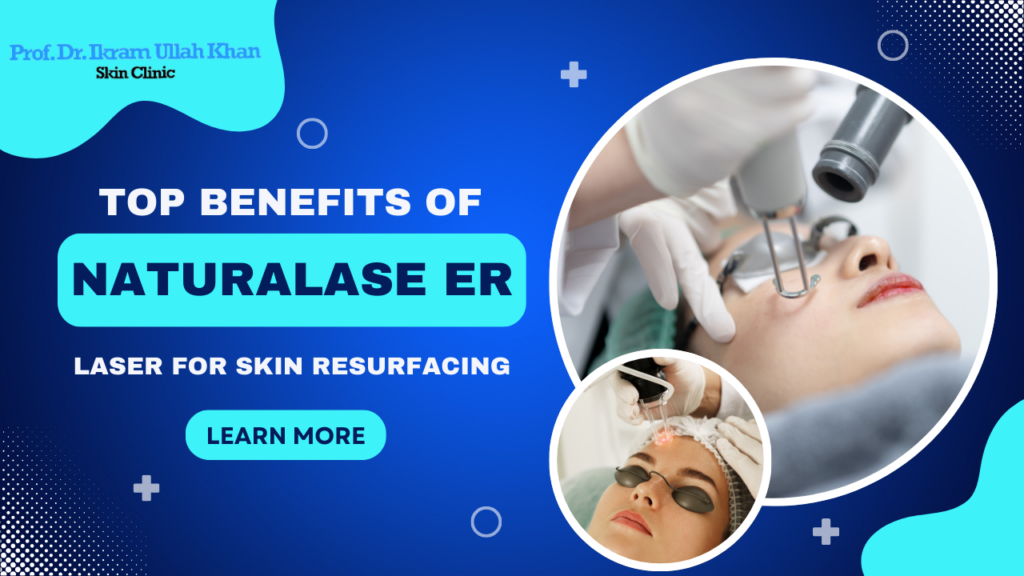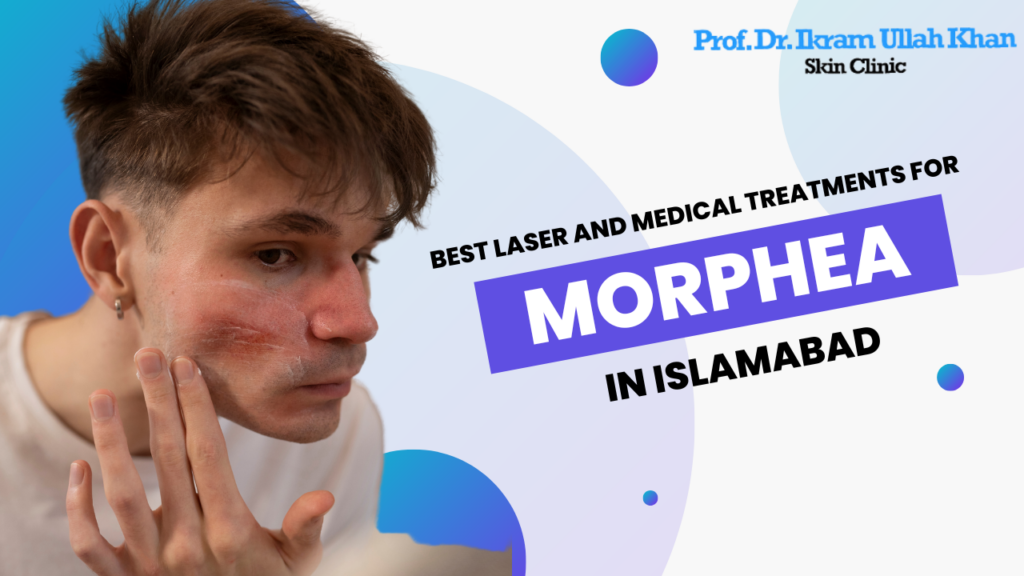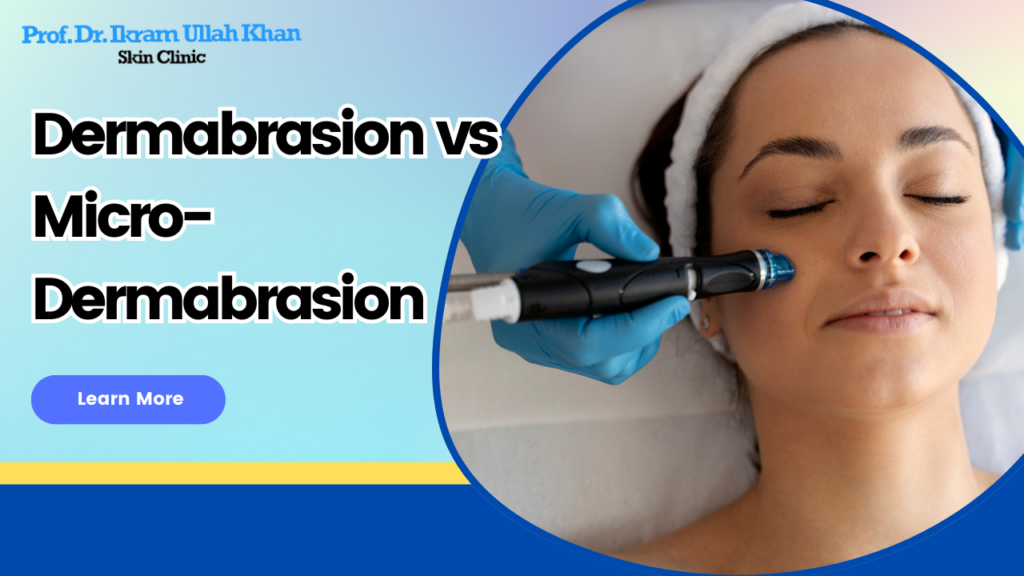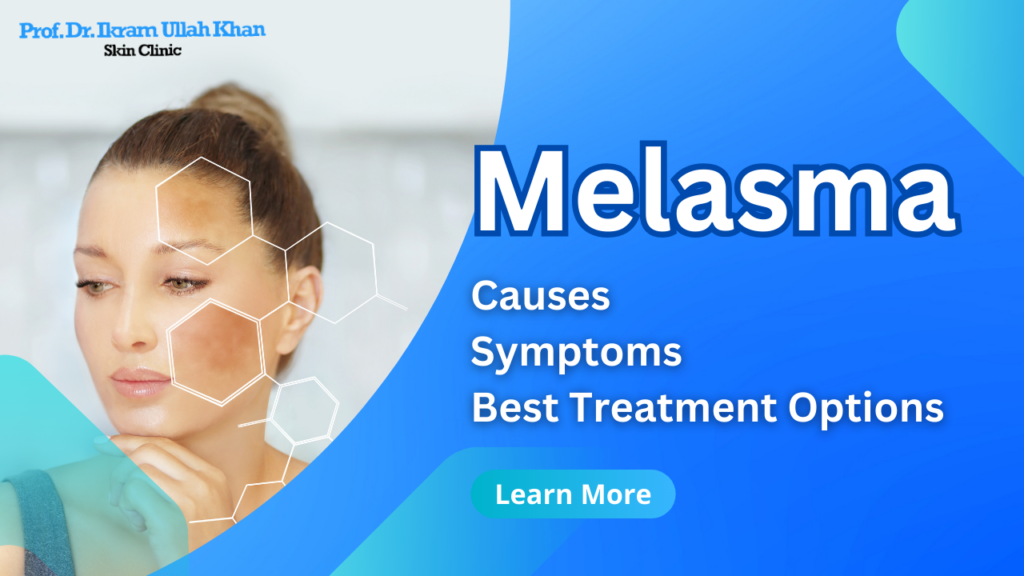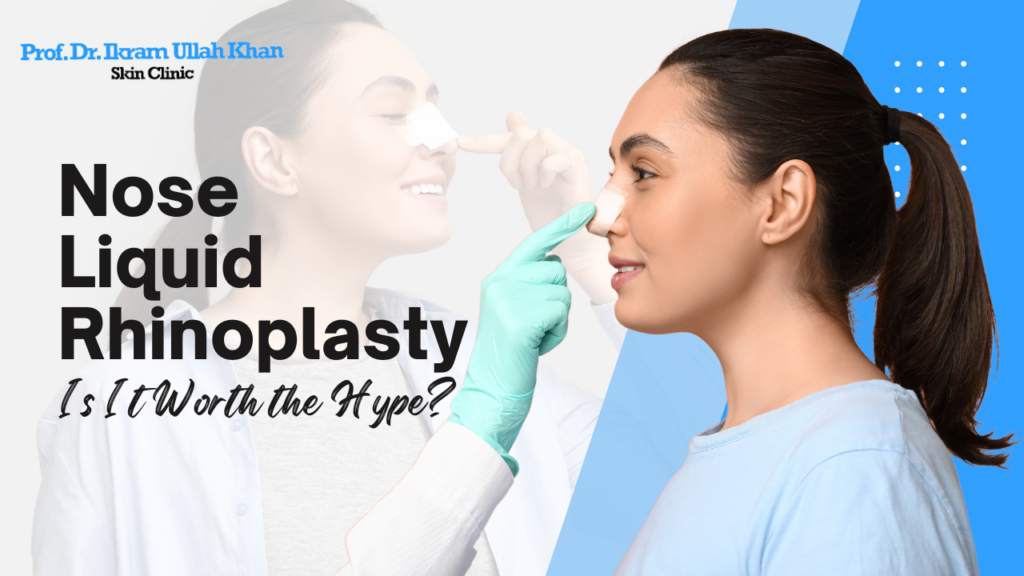
The rhinoplasty stands as a leading surgery because it reshapes nose structures for symmetry correction as well as visual enhancement alongside breathing corrections. A “Liquid Rhinoplasty” represents a nose adjustment that takes place without surgery.
A non-surgical rhinoplasty also known as the liquid rhinoplasty constitutes a nose job without the need for surgery. Liquid rhinoplasty achieves outcomes comparable to those of surgical rhinoplasty using dermal fillers as an alternative procedure. A liquid rhinoplasty modifies nasal structures through long-term dermal filler treatments of the nose.
Patients appreciate this method because it provides rhinoplasty aesthetics without undergoing medical procedures. People might avoid surgical rhinoplasty due to expenses and extensive recovery periods along with the permanent nature of the procedure. Liquid rhinoplasty by Prof. Dr. Ikram Ullah Khan, the best dermatologist in Islamabad, eliminates these limitations together with other benefits.
The Effects of Liquid Rhinoplasty on the Shape of the Nose
Liquid rhinoplasty stands as a widely chosen non-surgical nose improvement method that enables people to enhance their noses without operating on their nasal structures. The use of hyaluronic acid-based fillers provides a method to correct particular facial characteristics. The technique is applied to smooth out small dorsal humps to create a better aesthetic appearance throughout the nasal bridge area. The strategic placement of fillers enables improvements to nasal features which results in a more attractive nose shape.
The procedure provides a painless experience through exact filler applications to selected areas. Patients develop only light swelling near injection points that remains only for a short period without restricting their ability to continue normal activities right away. The day following the procedure will require some temporary restrictions but these limitations will disappear soon.
People who undergo liquid rhinoplasty procedures need to grasp the fact that the nose structure remains essentially untouched unlike what traditional rhinoplasty achieves. The quick and non-invasive procedure should be understood within its performance limitations. Knowledge of these limitations helps patients establish practical expectations which leads to satisfactory outcomes. We will analyze particular medical issues alongside the capabilities of liquid rhinoplasty to resolve them (or not).
Treatment Abilities of a Liquid Rhinoplasty Approach
The liquid rhinoplasty provides several advantages to patients who need its effective treatment for specific purposes.
- Correct a dorsal hump
- The procedure fixes both nostril and nose asymmetries.
- Enhance facial symmetry
- The nose receives treatment for depressions and structural weak areas.
- Achieve understanding of how surgical rhinoplasty shapes up
Does Liquid Rhinoplasty Have the Ability to Correct Nose Deformities?
Treating a crooked nose through non-surgical methods requires proper attention to detail. Liquid rhinoplasty provides modest improvements for minor cases though patients need to recognize its restricted capability. Surgical rhinoplasty stands as the only means to fully correct excessively deformed noses. Proficient filler placement with Restylane allows experts to achieve better symmetry in cases with minimal deformities. Strategic applications of fillers enhance their ability to increase specific areas while hiding minor problems to generate the sensation of nose straightness. Succeeding with non-surgical nasal asymmetry therapy demands accurate expectation levels to obtain optimal results.
Can Liquid Rhinoplasty Fix a Wide Nose?
Liquid rhinoplasty proves inadequate for fixing wide or flat noses because of its defined purpose. The non-surgical treatment does not work to properly reduce the features of the nose. Surgery is the better choice than liquid rhinoplasty for people who want their nose reduced in size. Because of its method of filler injection liquid rhinoplasty may actually make the nose look wider instead of narrower. People wanting bold changes for their wide nose should consider plastic surgery since this method gives better results for their aesthetic needs.
Does Dermal Filler Rhinoplasty Shrink the Nose Size?
Liquid rhinoplasty has remarkable aesthetic benefits yet it cannot physically diminish the size of big noses. When performing liquid rhinoplasty surgeons place dermal fillers across specific areas of the nose to increase the treatment zone. The procedure can enhance facial balance but does not reduce nasal size even though it might make some areas appear smaller. People who need their noses to become smaller should choose traditional rhinoplasty surgery as the best option. Rhinoplasty treatments with fillers reshape and align different parts of the nose instead of making it smaller.
Does the Liquid Rhinoplasty Procedure Correct Nose Imbalance?
Using dermal fillers injections helps fix small nose asymmetry problems. Using dermal fillers to inject the nose creates balanced and improved results without surgery. A skilled injector provides small controlled fillers to modify nose contour thus hiding irregularities. This treatment can address minor issues effectively yet requires acknowledgment of its restricted effectiveness area. Severe imbalance problems especially those with structural flaws need surgical treatment. When making only small corrections patients discover the fast benefits of injections without extensive surgery.
Comparing Liquid and Surgical Rhinoplasty
You have multiple routes to modify nose shape including liquid rhinoplasty and the standard surgical procedure. The methods and results of these procedures are obviously different despite their shared purpose of nose improvement. Patients can receive non-surgical nose alteration at our office through injectable filler procedures that change nose appearance temporarily.
Risks and Complications: A Comparative Overview
Non-surgical rhinoplasty includes potential side effects such as:
- The procedure causes minor pain plus light swelling in certain injection parts with no major effect.
- Rare but serious complications: movement of fillers, blood vessel problems.
Surgical rhinoplasty involves:
- The process may cause pain and bleeding along with swelling in the treated area.
- Patients may need additional operations to enhance their results or treat undesired outcomes.
Cost-Benefit Analysis
Non-surgical Rhinoplasty:
- Lower immediate cost.
- Liquid filler effects disappear over time so patients must undergo multiple treatments which adds more expense.
Rhinoplasty surgery:
- Higher upfront cost.
- Entire procedure becomes cheaper because patients avoid future operations after the initial procedure.
People who want temporary fixes or need time to decide about surgery use this non-surgical approach. For permanent results the traditional surgery is suitable provided the individual accepts higher upfront cost and extended recovery time.
Liquid Rhinoplasty Attributes:
- Temporary
- Minimal downtime
- Ongoing treatments needed
- Rhinoplasty surgery’s major benefits:
- Results are permanent
- One-time expense
- In addition to better looks the procedure helps with breathing problems.
The Ideal Candidate for a Liquid Nose Job
Desire for Minor Changes
Some individuals will require surgery as their only solution to improve their nasal structure. The liquid nose job suits candidates who want slight nose tip adjustment plus smoothing while it cannot perform significant changes or reduce nose size.
Having clear expectations and open-mindedness about both surgical and non-surgical consultations ensures that you pick the best solution for your needs and feel pleased with the outcomes.
No Major Structural Issues
Major structural issues need surgical rhinoplasty services instead of non-surgical treatments. You will need surgical breathing problems to solve them.
Your consultation with the doctor will help you learn if you qualify for a liquid-nose treatment.
Minimal Discomfort
Even though the liquid nose job may cause minor pain it needs no general anesthesia to complete safely. Since the dermal fillers use local anesthesia you can feel a minor needle touch when the filler is applied and there is light pressure during treatment placement.
For the next few days your nose will be tender but easy to manage by taking over-the-counter pain medicines.
The overall length of treatment stands at approximately 30 minutes. Great outcomes need extensive hands-on training plus decades medical experience like Prof. Dr. Ikram Ullah Khan, the best dermatologist in Islamabad.

